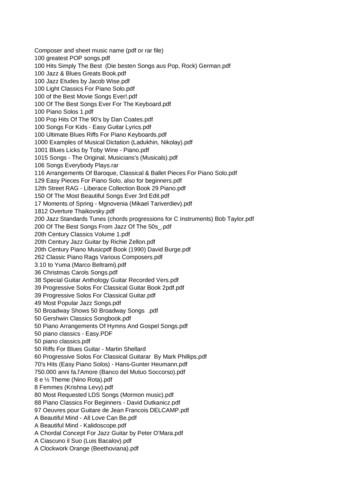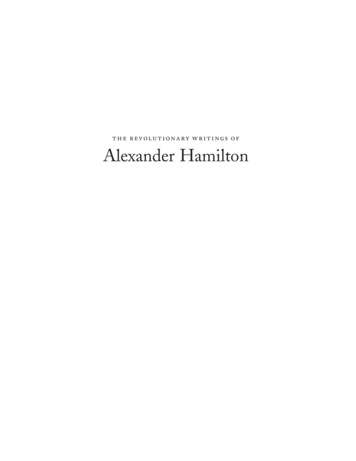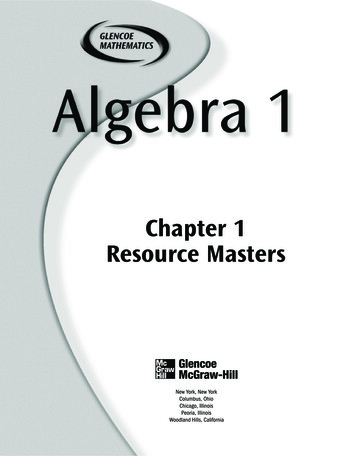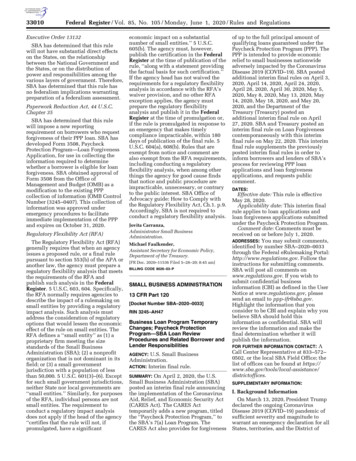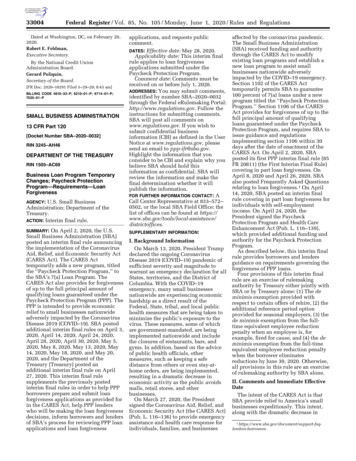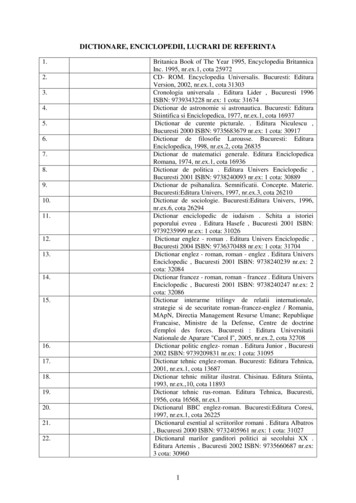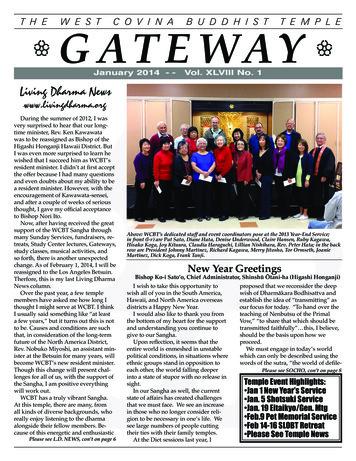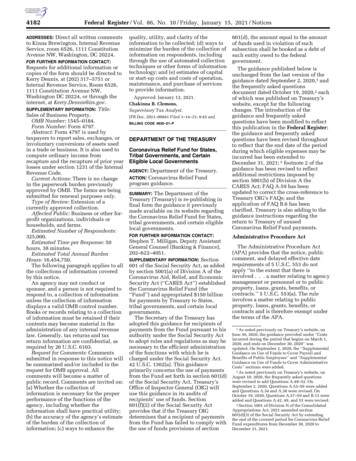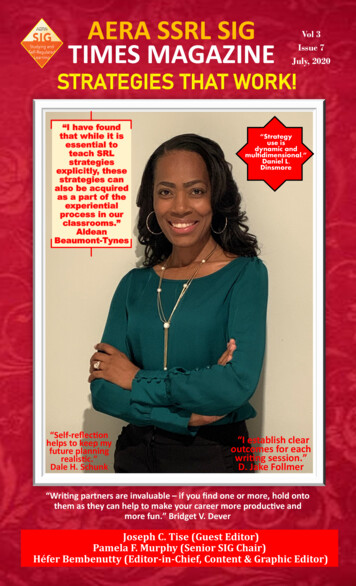
Transcription
Vol. 2 Number 1 A Publication of The Urantia Book Fellowship Winter 1999-2000
Cover: The Souls’ Journey, oil on canvas, 40” x 40”. Reproducedwith the artist’s permission and blessings.Freydoon Rassouli was born in Isfahan, Iran, and was raised in ahistorical home decorated throughout with murals and intricatearabesque designs.In 1963, Rassouli migrated to the United States. While studyingpainting and architecture at the University of New Mexico, hewas the recipient of the Leadership Award from the Institute ofInternational Education.He calls his unique style “Fusionart,” a term created and registered by him. The foundation of this style is derived from mysticism and near eastern spirituality and is structured after westernpainting technology.As a painter, Rassouli creates images of cosmic unity. His canvasesconcentrate on the illumination of life and the Divine Beauty, twoconcepts that have been the most influential in shaping Rassouli’sart.You may view more of Rassouli’s work at: www.sevenseasart.com.
“Cosmic Citizen”When told of his future universe careerall the young boy could say was, “Alllright!”CONTENTSVOL .2 NUMBER 1WINTER 1999-20002The Family: Birthplace ofCosmic CitizensPaul Snider19 Reflections on Cosmic Citizenship(Rumor, Gossip, Hearsay)Stephen Dreier8An Expression of Cosmic WorshipPoem by David Glass22 The Dual Nature of SupremacyLinda Buselli9Two Cosmologies:Astronomy and The Urantia BookIrwin GinsburghPublications Committee Members: Avi Dogim, Chairman, Linda Buselli, Gary Deinstadt,Nancy Johnson, Carolyn Kendall, Sage Waitts Editor: Avi Dogim, Winter Edition Design& Layout: Sage Waitts Masthead Design: Courtesy of Nick Curto Published bi-annuallyby Uversa Press, a subsidiary of The Urantia Book Fellowship, 529 Wrightwood Avenue,Chicago, IL 60614-1794 Phone: 773/327-0424 FAX: 773/327-6159 E-Mail:fellowship@urantiabook.org Quotations are from The Urantia Book unless otherwise noted.Letters to the editor are welcome and will be published at the discretion of the editors,subject to space considerations.Contents Page ArtCosmic CitizenSage Waitts is a member of thepublications committee,professional graphic designerand amateur photographer.Cosmic Citizen is a moment intime with her godson, Jai.Winter 1999-2000 The Fellowship Herald 1
THE FAMILY: BIRTHPLACE OF COSMIC CITIZENSPaul Snider, Evanston, IL(Plenary Address presented at the Fellowship’s International Conference, August 1999, Vancouver, British Columbia.)I salute the God within you.We bring a child into the world. A simple and ordinary thing, but wonderfully complex. Whether we knowit or not, we have now become engaged in the supremeresponsibility of human existence 1. We have now begunthe process of nurturing and shaping a cosmic citizen.What faith the Father in heaven has in us to allow us theprivilege of doing this 2. To entrust His children to ourwatchcare 3 . Of all human trusts, this is the most sacred 4,our highest human duty 5. Whether we know it or not,these are the facts of life. (By the way, you’ll notice quitea few Urantia Book references in what I have to say. I’llmention only a few of them specifically.) What is it aboutthe idea of family that makes it so profoundly important?Why does The Urantia Book say that almost everythingof lasting value has its roots in the family 6, that the homeis civilization’s only hope of survival 7? Why is it that thefamily occupied the very center of Jesus’ philosophy oflife, here and hereafter 8? What is it in this simple notionthat resonates from here to Paradise and beyond?I think we can find some of the answers by lookingat what families do. Every family is unique. No two haveexactly the same dynamics. And yet, families all do theessential in life 9 . This is what The Urantia Book tells us.This is what our own experience confirms. Well, whatare the essentials of life?First and foremost, we begin to learn about love,how to love, how to be loved. All of the foundations ofcosmic citizenship are built upon the enduring base oflove. Without love we are nothing. Without love there isno place for us in the universe. In the way we love ourchildren we begin to get a glimmer – we actually begin toexperience – the way God relates to His universe children. And at the same time – if we get it right – we portray to our children the first of a long series of ascendingdisclosures of the love of God for all universe children 10.We begin to portray unconditional love.Second, we learn about mercy. I have so often received mercy that I did not deserve, that I have come todefine mercy as what you extend to someone who doesn’tdeserve it. If it’s deserved, it’s not mercy, it’s justice.Someone once told me that home is where you gowhen you can’t go anywhere else. When I think aboutthat, when I think about all the children who can’t evergo home again – when I imagine their eyes – it tears myheart out. Mercy is what you extend to someone whodoesn’t deserve it. Home is where we first begin to learnabout mercy and forgiveness. Mercy is applied love 11.Third, we learn about ministry. A true parent continuously ministers to the child 12. And ministry does notmean indulgence. Just the opposite. Ministry focuses onthings that build character. In time, children come to rec-INFAMILY LIFE WE ARE LIKE SHARP ROUGH -EDGED STONESALL THROWN TOGETHER. WE CONTINUOUSLY TOSSAGAINST EACH OTHER IN THE RIVER OF TIME.same things, with greater or lesser skill.In family life we are like sharp rough-edged stonesall thrown together. We continuously toss against eachother in the river of time. After all the rubbing and rubbing the sharp edges begin to disappear. We becomesmooth pebbles. We adjust our antagonisms. We teachthe pursuits of peace to our children 6. The family is themaster civilizer 9 .With some assistance from friends, neighbors, andcommunity, the true family teaches most of what is reallyCopyright 1999 by Paul Snider. All rights reserved.2 The Fellowship Herald Winter 1999-2000ognize this and appreciate it. And this service endures aslong as there is a parent-child relationship. You never stopbeing a father. You never stop being a mother.The list could go on and on. So many other things.The family teaches culture to the next generation 13. Thefamily teaches patience, altruism, tolerance, forbearance14. And it also teaches duty, responsibility, discipline, consequences. It teaches us that we are all bound together,that we rise or fall, a little bit or a lot, with the actions ofeach member 15. It’s not like a big corporation in whichyou can say: We’re having some financial problems this
year. We’ll have to downsize. Sorry, but we’ll have to let afew of you kids go. Good luck 16.No way. In a family you can’t lay off or fire anyone.The family teaches: We are all in this together. We willrise or fall with each other . . . Somewhere the thoughtrecurs again and again in my mind: It is the Father’s willthat none should be lost.Six months after I discovered God I discovered TheUrantia Book. This was in 1965, and Mary has been withme in this since the beginning. I can’t begin to tell youhow valuable that has been. The Urantia Book made usaware of a presence, within our reach, of a sphere of lifeinfinitely more valuable than the natural life of humankind 17. We wanted to find out more about this, exploreits higher pathways wherever they would lead. We wantedto introduce our children to the majestic cosmic framework of the Urantia teachings. But how?This was no easy question.Not knowing what else to do, we plunged ahead.We made every mistake we could think of, and a few more.We tried reading passages from the book at dinnertime.We tried formal lessons, with lesson plans and diagrams,the whole works. A certain telltale glaze would come overthe children’s eyes. We tried to make a family study group.We tried a few disastrous family councils. We weren’t connecting.One day, at the mention of Jesus, we observed aboutseven or eight seconds of pure, apprehensive silenceamong the children. Then one of them said: “Here comesanother brainy lecture.” That stopped us in our tracks.We felt like total failures. For more than six months wemade no mention of the book or the teachings. And thenwe began accidentally to stumble forward into the light.What began to work was quite simple and practical. It started at the dinner table. Over the months andyears that followed, we did other things – we did a lot ofstudy group activity, always with children who were freeto wander in and out as they pleased. We took part foryears in a beautiful meeting for worship in an organizedreligion. But it was the dinner table that turned the tide.Mary and I had both taken steps to arrange our livesso that we could have family sit-down dinners. No television. No distractions. I restricted my travel to only a fewdays a year.Sitting around the table we began to tell stories fromThe Urantia Book. We didn’t plan this as a teaching exercise. It just unfolded naturally from our enthusiasm. Webegan to tell stories about the Garden of Eden, Adamsonand Ratta, the fandors, the midwayers, the goings on inDalamatia, the Lucifer rebellion, Van and Amadon, lifeon a neighboring planet, what happens when you awakenafter mortal death, the morontia journey, Jesus on MountHermon, Jesus and Rebecca – so many Jesus stories. TheUrantia Book has lots of good stories. Some of them arespectacular.The children found these stories fascinating, andwould ask questions. It was a natural and easy transitionto move beyond the stories into teaching. In the normalconversations about the events of the day, issues wouldalways arise from which the perspectives of the UrantiaPapers could shed some larger illumination.Much of what we tried to teach came in response toquestions. All of the children have great curiosity andlively imaginations. But in the beginning, we tended toover-teach, to say too much. We quickly found we had tolearn a fundamental lesson, which was this: The childmust remain in control of the learning process, and feel incontrol.Because of your own enthusiasm for the teachings,you may not always watch closely enough for body language that tells you the point has been made or the lesson has ended. You have a great urge to add one morethought to round out the concept, to list one or two additional facts, to give one more example, to offer one morecogent observation. . . Don’t.When the look in the eye stays stop, when the bodylanguage says stop, bite your tongue and stop. Let thechild remain in control. This makes all the difference. Itkeeps things relaxed. It stimulates the child to keep onasking questions. . . I can remember nights when we neverleft the dinner table until midnight. Two children on oneknee, another child on the other knee. Questions, questions, questions. It was exhilarating.There is one other thing I should mention aboutthe dinner table discussions. Mary and I quite often seethings in different ways. We share the same values, butour perceptions come in from different angles. I shouldalso mention that Mary – bless her heart – has never beenhesitant to speak her mind. Over the years there weremany times when Mary and I would present different interpretations of some of the Urantia teachings. At thetime I thought to myself: My God, we are really going toconfuse the kids. It was not until many years later thatwe learned they weren’t confused at all. What they tookaway from these exchanges was this: There is no dogma.You are free to have your own opinion. For a young mind,this was a liberating revelation.In our years of child rearing there were two thingswe were consciously trying to do. More than anythingelse, we wanted each of our children to develop a personal, private, powerful relationship with God, and a desire to follow the inspiration of Jesus’ life and teachingswherever it would lead them.Second, we wanted to help our children develop aWinter 1999-2000 The Fellowship Herald 3
framework for living their mortal lives that would be fullyconsistent with all phases of living anywhere in the universe beyond – through all the morontia progressions,even to the realms of Paradise. We wanted our childrento feel at home in the universe 1 8 , to know we have friendson other worlds.We didn’t call this cosmic citizenship then, but inretrospect that’s what we often talked about. Except forthe Supreme. We just nibbled around the edges of theSupreme. Cosmic citizenship does not begin in the mansion worlds. It begins here and now. One of the majorpurposes of The Urantia Book is to tell us that. Beyond itspurpose of spiritual transformation, the revelation introduces us to the idea that we are entry-level participantsin an immense enterprise. It says in effect: Folks, this isthe way the universe works. It’s time you knew it. Theseare the facts of universe reality. Start getting used to it.We live more and more of our being within the Supreme Being 19 – the evolving Mother God 20, the FiniteGod 21, the God of Time and Space 22, the God of Experience 23. We can only approach the Supreme by means ofexperience 4. We have to do something 25. We cannotevolve without the Supreme. The Supreme probably cannot evolve without us 26. Thus, we have a duty to theSupreme 27. Our duty is to help build dynamic levels ofexperience-based spirituality into the immanence of theSupreme 28. This is a big job. It involves the entire granduniverse 29. We have to work together to do our tiny, tiny,tiny irreplaceable part 30.Where do we start? How do we begin? I am going tosuggest eight types of action, eight modes of living, thatrepercuss in the Supreme, that not only help us evolve,but also help the Supreme evolve. There are many, manymore things we can do in addition to these eight ideas,but these eight are illustrative of how we can proceed asindividuals. I won’t even try to suggest how we can proceed as groups. But as individuals, these are the kinds ofthings that begin to build an enduring foundation forcosmic citizenship. In more extended detail, these werethe kinds of things we discussed over the years aroundthe dinner table.T HE FIRST A CTION IS TO STAY FOCUSED .STAEach of us has to make a decision about survivaland continuing growth, to become ever more godlike. Wehave to want to go forward. Mary and I gave absoluteassurances to the children that none of them would everbe dragged kicking and screaming into higher states ofbeing. When life gets you down, stay focused on the largerscheme of things.Staying focused means staying focused on theFather’s will as the singular enduring principle of all ex4 The Fellowship Herald Winter 1999-2000istence, the sure pathway to progress now and forever.But there is an important companion word. We haveto stay intelligently focused. What this does not mean issaying: Hey, boss, tell me what to do and I’ll do it 3 1 . Youcan’t get anywhere near Paradise with that attitude. Youneed to supply some real volitional horsepower.What it does mean is intelligent partnership, alwaysknowing who the senior partner is. Intelligent focus meanswe express again and again – forever – within our mind,the full volitional power of the personality prerogativesGod has given us: Father, I will to do your will. I chooseyour will. I understand its supernal value.Many people believe the Father’s will applies onlyto big decisions, major actions. They think God is toobusy to get involved in the small and commonplace details of daily living. Those who hold this view simply donot understand that God is truly infinite.There is one phrase, just part of a sentence in TheUrantia Book, that clearly teaches that the will of Godextends even into the smallest details of life, that at every moment of our conscious being, we have the opportunity to choose His will. The sentence is on page 1555,in the middle of paragraph 2, in a description of theApostle John.I think this is the most powerful sentence in TheUrantia Book. It says that Jesus always deferred his slightest wish to the will of the Father in heaven.To the casual mind 3 2, commitment at this level –the 100% level – would be terribly restrictive, like a straitjacket. It would turn us into spiritual zombies. The factis, it would lead to just the opposite. The Father’s will isthe greatest liberating force in the universe. Jesus provedthat over and over again in his life. And the more fullywe progress as cosmic citizens, the more fully we will comeactually to experience the truth of this statement.T HE SECOND A CTION IS TO STAY RELAXED .STAI don’t mean lounging around in your bathrobes. Imean inwardly relaxed. Spiritually relaxed. Don’t keepfeeling your spiritual pulse. The action nucleus of thisidea comes in moving from a state of tension to something approaching spiritual serenity. We will have to dothis long into the future. You can’t grow when you’re tense.The most spiritually relaxing story I ever heard grewout of a meeting long ago between George Foxx, founderof the Quakers, and William Penn, before he moved toPhiladelphia. As the story was told to me, Penn was thena young Englishman, a pretty tough guy, a sword-carryingswashbuckler. He was becoming interested in the Quakers and was thinking of joining their religious society. Buthe was hesitant. So he met with George Fox.Penn said: “If I become a Quaker, how long can I
carry my sword?”Fox said: “Let’s sit down and pray together aboutthat.”They prayed together for a good period of time. Thenfinally, Fox looked up and said: “As long as you can.”I think this story reveals God’s attitude toward us.Go forward with your whole self. Don’t keep looking backat the baggage you left behind. Carry your sword as longas you can. But when you put it down, when it’s just notyou anymore, put it down forever.T HE THIRD A CTION IS TO STAY BALANCED.STAJust because we study The Urantia Book doesn’tmean we are in a halfway house to heaven. All it meansis that we have expanded potential. We are not chosenpeople. We are not special. What we have is the sustenance of a far-flung cosmic perspective 33. Our challengeis to translate potential into actual – into living the teachings we have begun to comprehend. But the road fromhere to there is long and difficult.Always, we emphasized: Use common sense. Keepthings in proportion, even The Urantia Book. Assimilatethe wholeness of the teachings. Don’t get lost in a singlepart.when we were in the presence of an exaggerated religiousego 34.With Jesus as your role model, these assessmentsare much easier to make. The symmetry of Jesus’ personality is balance in its most exquisite form. We are clearlytaught that “ the secret of his unparalleled religious lifewas his consciousness of the presence of God; and heattained it by intelligent prayer and sincere worship –unbroken communion with God – and not by leadings,voices, visions, or extraordinary religious practices 35.”That says it all.T HE FOURTH A CTION IS TO STAY LO YAL .FOURTHSTAStay loyal to the highest values you can comprehend. We have been taught that human loyalties, oncemobilized, are hard to change 3 6 . Our most profound loyalties underlie the actions of everything we do.We wanted our children to find pathways that wouldlead to the deepest ranges of soul mobilization.Jesus placed a very high premium on loyalty. Andso does the human race. The Urantia Papers tell us thatchildren are permanently impressed only by our primaryloyalties 3 7 . And children cannot be fooled about this.When we have established the sovereignty of truth,WITHOUT LOVE THERE IS NO PLACE FOR US IN THEUNIVERSE. IN THE WAY WE LOVE OUR CHILDREN WE BEGINTO GET A GLIMMER – WE ACTUALLY BEGIN TO EXPERIENCE– THE WAY GOD RELATES TO HIS UNIVERSE CHILDREN.Year after year, as a family, we witnessed individualswalking around with Urantia Books, but who had clearlylost their balance and were becoming strange. Some ofthem seemed to do it all by themselves. Some of themseemed to fall victim to the distractions that interlacethe Urantia movement.We consistently taught the children that there isinherent dignity and worth in every other person, that intime we will all become brothers and sisters of destiny.And we often told our children that we can never knowwhere, or when, or how the light of God will illuminateanother mind. The only thing we can know for sure isthat God always works in strikingly original ways. So weshould listen carefully to what others say, try to remainspiritually aware.Over the years, all of us had to weigh these teachings against the observations and assessments necessaryto determine when we were in the presence of truth, orbeauty, and goodness in our heart 3 8, we will nurture itand support it wherever we find it. We will be loyal towhat these values represent.People tend to say truth, beauty, and goodness almost as a singular phrase. They grasp what truth means.They understand goodness. But too often – much toooften – people forget that beauty is the middle word, ofequal value with the other two. Beauty is a primary aspect of God we too often ignore.Not only the beauty of things physical and material, but also the beauty of relationships in which the integrity of the relationship is honored and never violatedor betrayed. Beauty of the spirit of things. Cosmic levelsof beauty. Beauty that rises within the great spiritual powerof wholehearted devotion to a common cause, mutualloyalty to a cosmic Deity 3 9.The great thing we can teach our children is hopeand faith in the ultimate goodness, truth and beauty ofWinter 1999-2000 The Fellowship Herald 5
creation.God-centered loyalty is fundamental. Loyalty totruth, beauty, and goodness is fundamental. Our primaryloyalties will be tested over and over again in our godwardadventure. And these tests will usually come out of ambush, to catch us when we’re not looking, to capture whatis the real spontaneous and instantaneous reaction of theheart.T HE FIFTH ACTION IS TO STAY DETERMINED .STAPersevere. Grow to the maximum of your being.Don’t ever stop, except for an occasional rest. Use thetalents you were given. Use it or lose it 4 0 – that’s the lawof the universe.Life will knock you down again and again. Get upstronger each time. Pick yourself up and go forward. Learnfrom your mistakes. Become better for the experience.One of my favorite stories comes from the boxer,Archie Moore. Archie Moore had remarkable enduranceas a fighter. He was 45 years old and still knocking 22year olds out of the ring.One night Archie was up against a tough youngfighter in a 15-rounder. Archie was holding his own rightinto the 15th round when his opponent knocked him tothe canvas. The referee began the count. At the count ofnine Archie got up, and quickly proceeded to knock theother guy out of the ring.In the dressing room some reporters crowded aroundArchie. You know how reporters are – sometimes theyask really dumb questions. But sometimes the dumb questions produce remarkable answers. One of the reportersasked: Archie, when you were down for the nine-count,what were you thinking about?Archie thought for a few moments, then he said:“Well, I kind of got to thinking” – like he’s got all afternoon – “if I don’t get up off the mat, I’m gonna lose thefight.”That story has inspired our whole family for 30 years.When times are really tough, when you have worked tothe point of utter exhaustion and there is still more to do,when you’re up against an impossible deadline and allthe energy seems gone, when the odds against you seemoverwhelming, just say to yourself: If I don’t get up off themat, I’m gonna lose the fight. Then get up off the matand win the fight.T HE SIXTH A CTION IS TO STAY NONJUDGMENTAL .STANONJUDGMENTALThis is an action because you usually have to workat it. It doesn’t just pop into your head naturally as yourfirst response, unless you have become very spiritual.Staying nonjudgmental means we have to be cautious about making judgments about other people, espe6 The Fellowship Herald Winter 1999-2000cially about their motives. I’m sure that all of us, at onetime or another have found ourselves accused of motivesthat were the exact opposite of what we were thinking.So we all understand the social danger.To be judgmental is to be quick to condemn, quickto assign motives, quick to assume a superior morality;quick to gossip, quick to mistrust. I think we can all imagine that life in the cosmos cannot proceed on this basis.So it is best we start learning the lesson now, that webegin to place a high value on accuracy. To give othersthe benefit of the doubt. To approach life situations witha nonjudgmental attitude.Sometimes what you think you see is not what you’reseeing at all. The Urantia Book portrait of our snarlingprimitive ancestor facing a sabre-tooth tiger is only oneof countless examples we could use. What we are instructed to look for is the truth content in what is goingon.Here is one of my favorite examples 4 1. About a thousand years ago King Canute the Great united Denmark,Norway, Southern Sweden, and England into a Vikingempire. The history books you probably read told you thatCanute had a massive ego and was so intoxicated withpower he did a strange thing. He took his throne chair tothe edge of the sea and commanded the waves to stop.This is the story of the false historian.The true historian would tell you this. Yes, Canutedid take his throne chair to the edge of the sea. Yes, hedid command the waves to stop. But let’s look at themotive behind the act.Canute was angered by the constant flattery of thosearound him. They kept telling him he was so powerful hewas capable of any achievement. He needed to teach thema lesson they would never forget.After ordering back the sea and getting his feet wet,Canute then said: “Let all men know how empty andworthless is the power of kings, for there is none worthyof the name but He whom heaven and earth and sea obeyby eternal laws.”Afterward, Canute never again wore his crown. Hehung it instead in Winchester Cathedral.So what looked like ego and intoxication of powerto a false historian was in truth a demonstration of profound humility to a true historian. Let us not becomefalse historians, even in the small details of our daily livesand interactions. This is a lesson for all time.T HE SEVENTH A CTION IS TO STAY DRIVEN .STAStay driven to excel in whatever you undertake. Youcan’t get to Paradise with half-hearted effort. The universe is a place of whole hearts. Might as well learn thatright now. Always do your best. Whatever is worth doing
is worth doing well. Put your heart into it. These are notclichés. This is Reality 101.We have been taught that “ it is repugnant to thedivine nature to suffer any sort of deterioration or ever topermit the execution of any purely personal act in an inferior way 4 2.” The work of this world is of paramountimportance, but important as it is, the work itself is notnearly so important as the way we do this work 4 3.As cosmic citizens, the quest for perfection – relaxed perfection – must become the underlying urge foreverything we do.T HE EIGHTH ACTION IS TO STAY COOPERATIVE .STACOOPERATIVEIf we’re not already cooperative in nature, we hadbetter start learning fast. One of the most important lessons we learn on this planet is teamwork 4 4 , how to workeffectively with other people, especially people who arenot at all like us. Once we learn the transcendent valueof teamwork, we will begin to get a glimpse of what isreally going on in the universe.So much to do. So many things to keep in mind.And this is not even basic training – it’s just the introduction to our basic training as citizens of a universe teemingwith life and purpose.Fortunately, The Urantia Book comes to our rescue.It provides a basic model for universe progression – a primary progression technique for cosmic problem solving.And it also reveals a primary progression attitude. Thesetwo things together will get you from here to there.The progression technique is very simple, and youalways have it with you wherever you are. The techniqueis to trade your mind for the mind of Jesus 4 5 – the Jesusof The Urantia Book. The Jesus we have come to know ashaving a superbly balanced character, a wonderful symmetry of toughness and compassion, an unflinching dedication to seeking and doing the Father’s will.As you face decisions, actions, situations, think toyourself: What would Jesus do? Your honest answers tothat question will begin to guide your actions with greatReferences1 941:32 79:5; 939:6,73 2067:24 1403:25 1389-906 765:57 943:28 1581:19 913:2,310 942:111 75:1012 941:413 909:514 94:615 619:116 An old cartoon? – Can’t recall17 Encyclopedia of Religion andEthics, Vol.11, p. 80818 1117:219 1280:5, 1283:220 1288:221 1266:3; 1283:422 1266:2; 1268:5; 1280:1; 1285:3;1296:723 1304:524 1289:525 1260:126 1284:627 1260:5; 1284:5,6; 1301:2spiritual power. Once you have done this with real success the first time – once you actually experience the mindof Jesus, however briefly, you will never want to go backto your old ways.The primary progression attitude is equally simple.A Melchizedek revelator tells us that the keys to the kingdom of heaven are: sincerity, more sincerity, and moresincerity. All of us have these keys within us, and we usethem by decisions, by more decisions, and by more decisions 4 6. In time, we build up a gathering momentum thatcarries us ever godward.Mary and I taught our children that The UrantiaBook is not the end of the search, but only the beginning.Everything in life becomes more fascinating in the cosmic glow of the Urantia teachings. The first time I readthe book cover to cover was in 1967. I discovered themajestic beauty of the writing, the supernal character ofthe philosophical observations, the symphonic quality inthe way the revelation unfolds. I have often said: I havebeen bored only four times since 1967.We live in a dangerous world, but one that is alivewith promise. All through the world, even now, we canfeel
by Uversa Press, a subsidiary of The Urantia Book Fellowship, 529 Wrightwood Avenue, Chicago, IL 60614-1794 Ł Phone: 773/327-0424 Ł FAX: 773/327-6159 Ł E-Mail: fellowship@urantiabook.org Ł Quotations are from The Urantia Book unless otherwise noted. Letters to the editor are welcom
